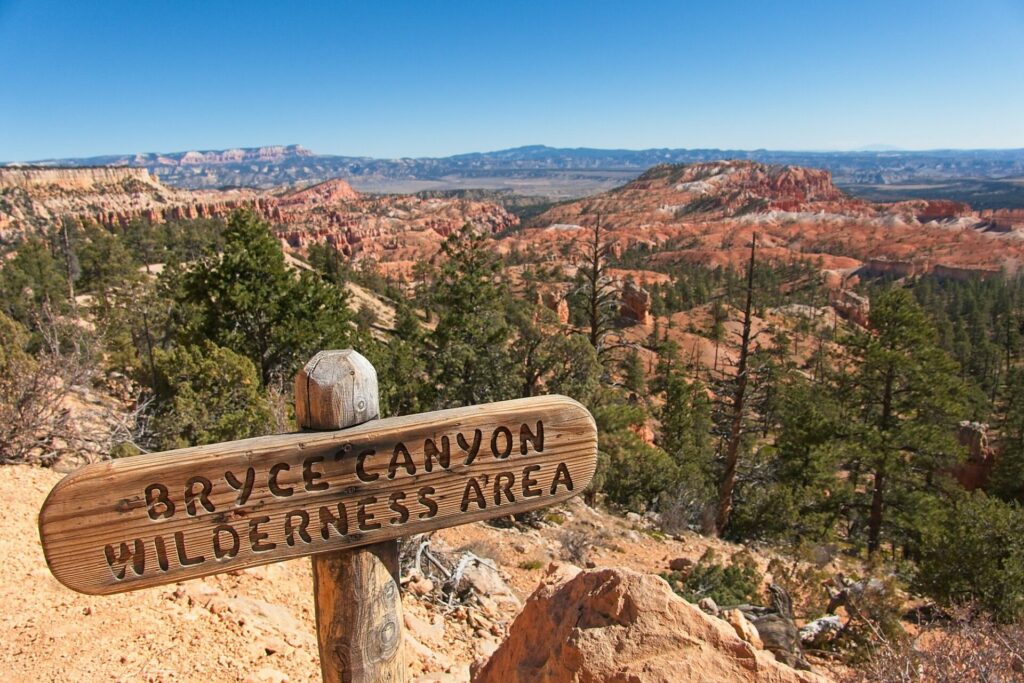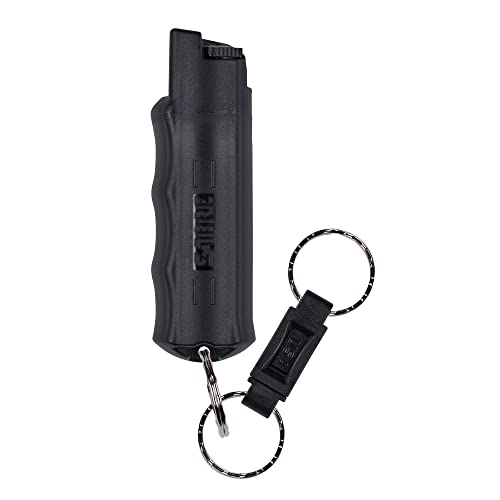Last updated on February 18th, 2025 at 10:26 pm

Are you planning a trip to Bryce Canyon National Park? Then you’ve come to the right place. Bryce Canyon is packed full of amazing hikes, super cool rock formations, and picture-perfect views. Hikers and nature lovers can’t go wrong there!
This article will explain what makes Bryce Canyon so impressive and provide tips for exploring the park on your own.
Hello! I’m Cindy. My husband and I lived in an RV for three years and continue to travel and adventure.
While living in our RV, my Mom, husband, and I spent three weeks exploring Utah’s Mighty Five! Before we arrived at each park (and while there), I spent a ton of time gathering information to make our trip the best possible.
This post is a highlight reel of what I learned about Bryce Canyon before and during our visit. It’s a one-stop shop for what you need to know!
I loved exploring the Mighty Five, but I REALLY enjoyed our time at Bryce, and I think you will, too!
So, read on to find out about the best Bryce Canyon hikes, why you should visit, and everything else you need to know before your arrival. Let’s get into it.
Things to Know Prior to Visiting Bryce Canyon National Park
These are just a few basics to know about Bryce Canyon:
Where is Bryce Canyon National Park Located?
Bryce Canyon is a smaller and more intimate experience than the Grand Canyon. It is four hours from Las Vegas, Nevada, and Salt Lake City, Utah.
Why is Bryce Canyon an Awesome Place to Visit?
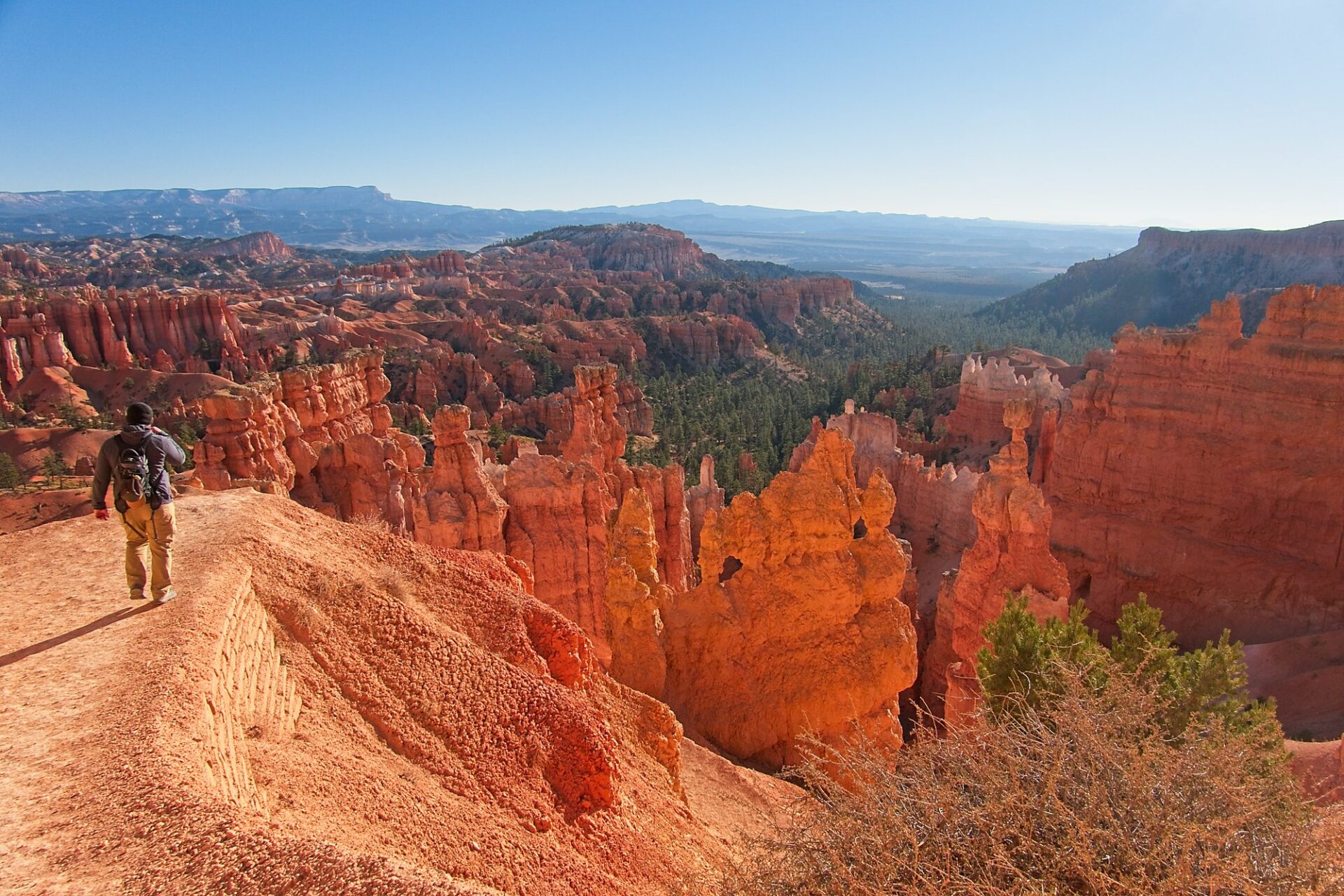
Bryce Canyon is a fantastic place to visit because of its otherworldly main attraction, the Bryce Amphitheater, which is filled with unique orange, red, pink, and white rock formations called hoodoos. These skinny spires can reach as high as a ten-story building and look straight out of Mars!
What I love most about Bryce Canyon (and what makes it my personal favorite of all five of the national parks in Utah) is that every shift in time and position while you’re there will create a brand-new scenic outlook. You can even stay in one spot! Different textures, features, and colors will pop in the scenery as the sun changes position throughout the day. I’m not sure I’ve ever taken as many pictures anywhere else in my life!
Bryce Canyon National Park offers beautiful vistas, great hikes, and fantastic photo opportunities—what more could you want?
When is the Best Time to Visit Bryce Canyon National Park?
When to visit Bryce Canyon National Park depends a lot on what you’re looking for out of your trip. Here are some tips and advice on when to visit.
What is the Best Time of Year to Visit Bryce Canyon for Hiking?
If you’re like me and are interested in hiking Bryce Canyon’s trails, you’d probably like the weather to be chilly or warm but not too hot. If that’s the case, the best time of year to visit is May or September! The daytime temperatures will likely remain warmer during these months; however, be aware that the evenings will likely be in the 30s, so be sure to bring warm layers to accommodate. (Plus rain gear if you’re going in September.)
Due to Bryce’s high-elevation climate, the weather can be a bit volatile. It’s not a bad idea to hike with layers at any time of year within the park.
An additional reason these months are a fantastic choice is because park resources will be functioning without the crowds. You’ll either be going right before many kids get out for summer or after they return to school for the year.
The months between (June, July, and August) are also a great choice, but be aware that the high temperatures can make it hot and dry during this time. The crowds will also be in full prime, and August can see a fair amount of rain.
What is the Busiest Month in Bryce Canyon?
Like most National Parks, Bryce Canyon experiences peak crowds during the summer months. Sixty percent of all visitors come between June and September!
If summer is the only time possible for you to visit the park, there are a few simple adjustments you can make to make the most out of your time:
- If you primarily want to see the sights in the Bryce Amphitheater zone, I recommend leaving your car in Bryce Canyon City and shuttling into the park. The shuttle doesn’t go everywhere in the park but covers most of the Bryce Amphitheater viewpoints and associated trailheads.
- Or, bring your car but visit beyond the Amphitheater. There will be fewer people in the parts of the park the shuttle does not reach.
When is the Rainy Season in Bryce Canyon?
Bryce Canyon receives the most rain between August and October. Although there are plenty of days without rain, intense thunderstorms can roll in quickly. Flash flooding is possible in the slot canyons, so exercise caution when it has been raining.
Is Avoiding Crowds Possible at Bryce Canyon National Park?
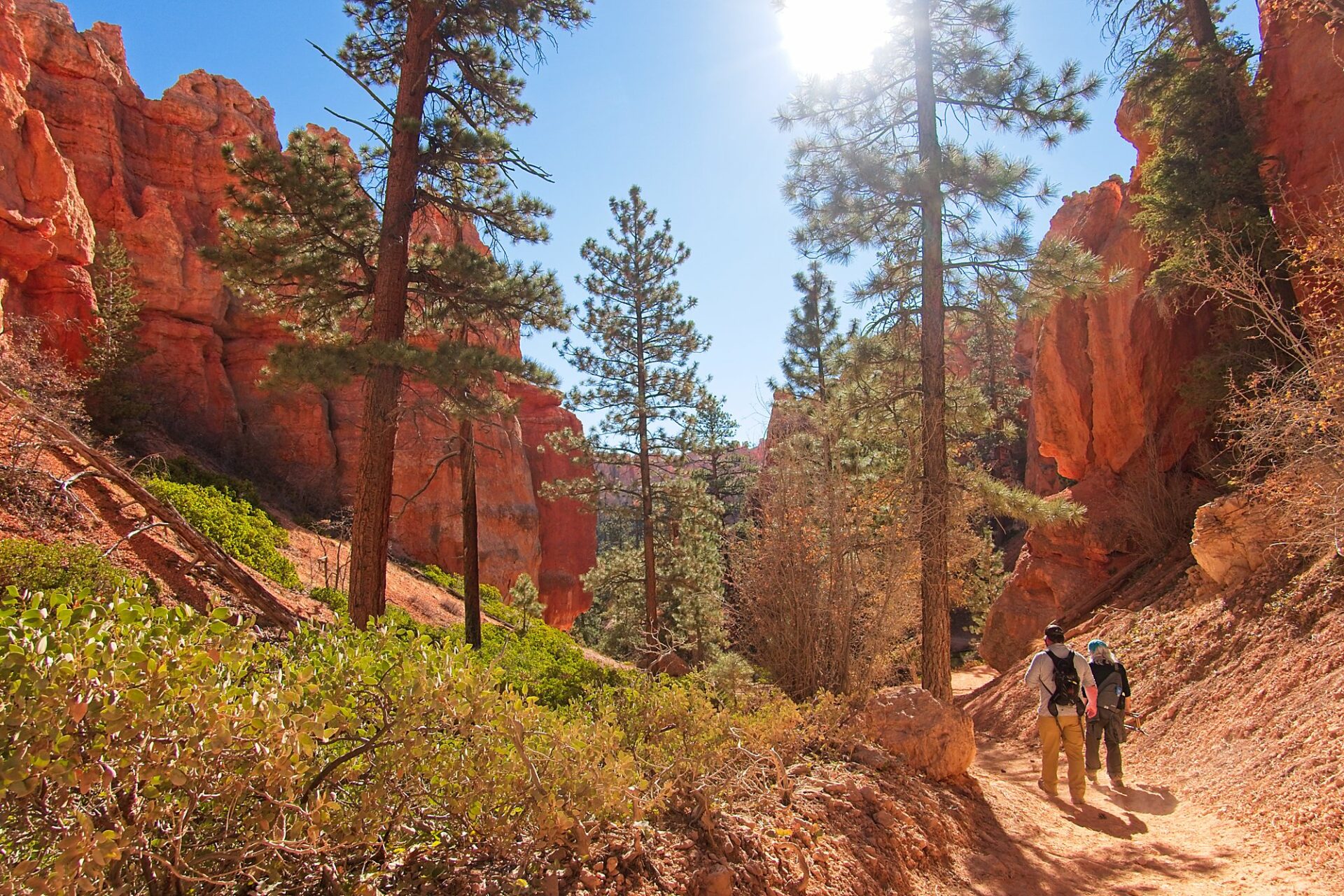
It’s totally possible to avoid crowds in the park. The best time to do that is between September and May.
If you go during the summer, I’d recommend entering before sunrise and driving to the back of the park. You’ll beat the crowds by getting in early and see the sights in the opposite direction as the crowd, which is the better direction anyway since all the sites will now be on the same side of the road as your vehicle.
Is Winter a Good Time to Visit Bryce Canyon?
Winter can be a great time to visit Bryce Canyon. There will be fewer people and the same gorgeous scenery—with some puffy white snow on top! Plus, you can snowshoe, cross-country ski, and enjoy other winter activities.
Ranger programs offered in the winter include a full-moon snowshoe hike (which provides snowshoes), and if you are going in February 2025, check out the Bryce Canyon Winter Festival!
If you want to seperately snowshoe or cross-country ski, Ruby’s Inn rents gear for both.
How to Get to Bryce Canyon National Park
Bryce Canyon National Park is in the Southwest corner of Utah.
To visit, you will either want to road trip from home or fly to a nearby airport.
What is the Closest Airport To Bryce Canyon National Park?
The closest airport to Bryce Canyon is Cedar City Regional Airport in Cedar City, UT. It is then a 1 hour and 40 minutes drive east from the airport to the park.
However, you’ll likely find cheaper tickets if you fly to a larger international airport. I recommend checking Las Vegas (LAS) or Salt Lake City (SLC). Both are four hours from the national park.
Rental Car
Once you land, you will need to rent a car to get to Bryce Canyon National Park.
…or be like us and rent an RV.
Getting into Bryce Canyon National Park
Now that you have a vehicle, up next is getting to and into the park! Bryce Canyon National Park has one entrance to its 18-mile road.
Visitors from the west (including those driving to the park from the Cedar City Regional Airport, the Las Vegas airport, and Zion National Park) will take I-15 North to exit 95 for UT-20 E, then US-89 S to UT-12 E to UT-63 S.
Visitors from the north (including those driving to the park from the Salt Lake City airport) will take I-15 South to exit 95 for UT-20 E, then US-89 S to UT-12 E to UT-63 S.
Visitors from the east (including those driving to the park from Moab, Arches National Park, and Canyonland National Park) will take I-70 West to exit 91 for UT-72 S, then UT-24 W to UT-62 W to UT-22 S to UT-63 S.
Bryce Canyon National Park Entrance Fee
As of January 2025, the entrance fees are as follows:
Private Vehicle: $35.
Motorcycle: $30.
Individual (hike, bicycle, etc…): $20 per person 16 and older.
You can purchase any of those passes upon arrival or here.
When purchasing, consider the year ahead.
Will you be visiting Bryce Canyon a couple of times or days? Consider purchasing the $70 Bryce Canyon National Park annual pass.
Or even better yet, if you’ll visit more than one national park within the next 12 months, purchase an America the Beautiful annual pass for $80 ($20 for US citizens older than 62), giving you access to all of the US National Parks for one year. You can learn more about that pass at the link above as well.
Free Entry Days: In 2025, there are six days that all US National Parks are free to enter. If you don’t mind crowds and love a good deal, consider visiting on one of those days.
What are the Best Ways to Get Around Bryce Canyon National Park?
The free shuttle service has several stops and is a great way to get around the park. For the 2025 season, it will start running in early April and go until late October.
The shuttle will get you to the visitor center, campgrounds, the Bryce Lodge, and a handful of scenic spots. Otherwise, you’ll have to drive yourself. You need a car to access the hikes at the southernmost end of the park.
I recommend getting into the park early as parking is very limited.
Alright! That’s everything you need to get in the park. Now, let’s talk about the best hiking trails and experiences in the park!
Best Hike in Bryce Canyon National Park for Beginners
This is the best Bryce Canyon trail for entry-level hikers visiting the park:
1. Mossy Cave Trail
Mossy Cave Trail is one of the most accessible hikes in the park. It allows you to get close to the hoodoos without having to descend a steep incline.
The total distance is 0.8 miles, and the elevation gain is only 150 feet, so it shouldn’t give a new hiker too much trouble at all.
In summer, you’ll see a beautiful flowing waterfall, and in winter, a frozen one— it’s the only waterfall in the park!
Note: Unlike most of the hikes on this list, this trail’s trailhead is on UT-12 rather than the main route (UT-63).
Best Hikes in Bryce Canyon National Park for Families
These are the best trails in Bryce Canyon trails for families visiting the park:
2. Sunset Point to Sunrise Point Portion of the Rim Trail
Hiking along the Rim Trail is an excellent way to see the iconic views of the Bryce Canyon Amphitheater and its impressive hoodoos from above. The entire trail is 11 miles out and back, with 719 feet of elevation gain. However, since it connects all the scenic points from Fairyland Point to Bryce Point, you can always shorten the hike and do a quick section.
So, while you can technically make this hike however short or long you want—from 1 to 11 miles—the best portion of the trail for families with young kids is the 1-mile paved section that follows the rim of the Bryce Amphitheater between Sunset and Sunrise Point.
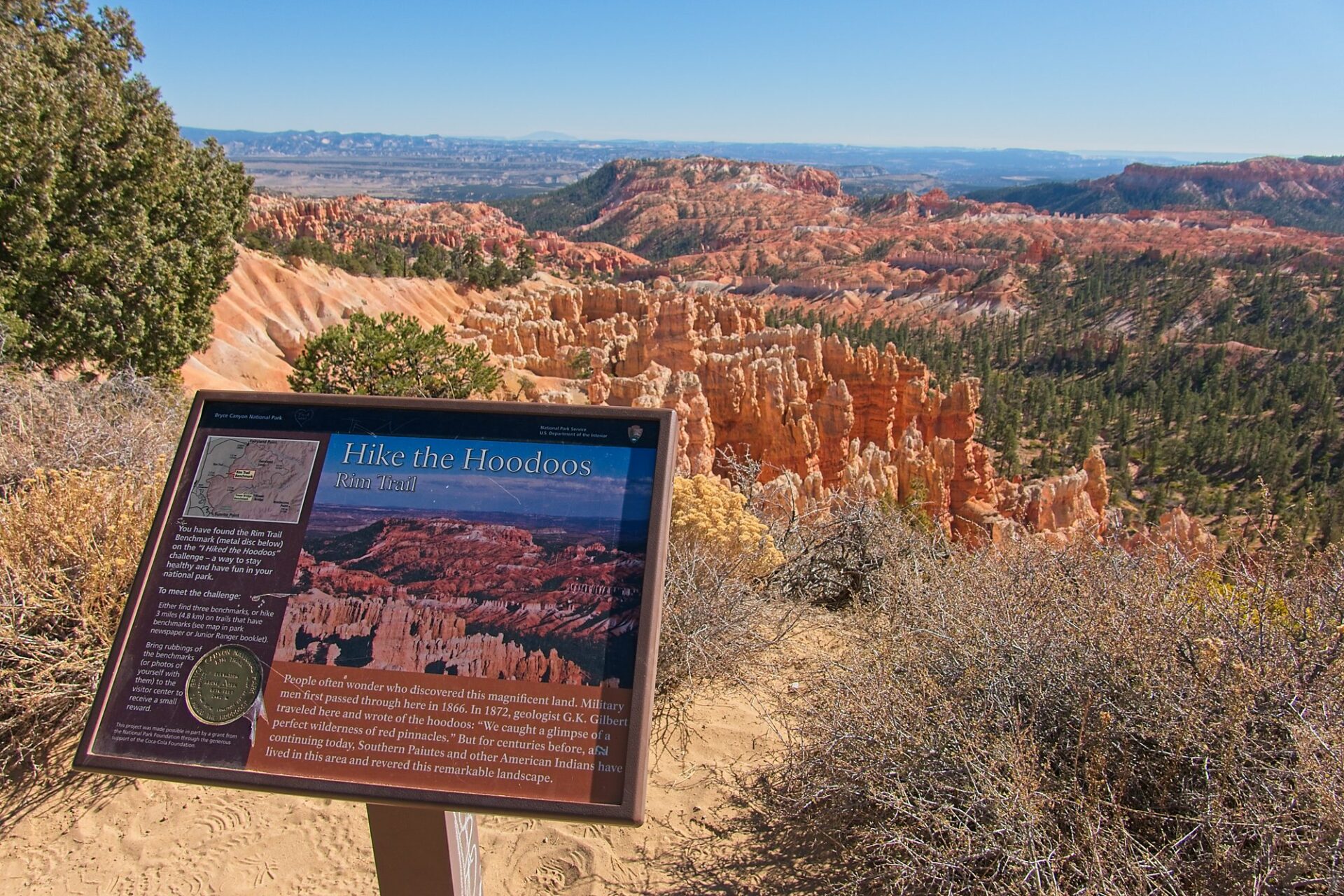
This straightforward walk, stretching half a mile each way with only 40 feet of elevation gain, provides excellent views of the hoodoos. Plus, since it’s paved, it’s stroller and pet-friendly. As a bonus, these viewpoints are also where you’ll find the park’s greatest concentration of hoodoos.
The views are stunning! You’ll have difficulty finding the perfect picture spot along this trail because the options are unlimited. Every few steps, you’ll find yourself snapping a photo, thinking that spot might have just been better than the last. (I did!)
Use stops 11 or 13 on the free park shuttle for this hike.
3. Bristlecone Loop (Plus Rainbow Point & Yovimpa Point)
You’ll venture through a thick, high-elevation spruce, fir, and pine forest along the one-mile Bristlecone Loop.
This relatively flat loop, with a minimal elevation gain of 200 feet, is fantastic for all skill levels. With the two added canyon viewpoints, it is only 1.3 miles long.
While here, be sure to stop at those viewpoints (Rainbow Point and Yovimpa Point) and experience two of the highest locations in the park. They both provide spectacular views of the canyon and the south-end hoodoos without having to tackle any extreme elevation changes on foot to get epic views.
Yovimpa Point is the park’s highest point. It offers one of the park’s most prolonged views, all the way to the Grand Staircase.
At Rainbow Point, you look north, back into the park. You’ll see dramatic views of undercut, sheer cliffs, and sometimes, you can even see Arizona from here!
Best Hikes in Bryce Canyon National Park for Intermediate Hikers
These are the best Bryce Canyon trails for intermediate hikers visiting the park:
4. Navajo Loop Trail

The Navajo Loop Trail is popular, so expect to see a lot of people on it (and the next trail)! This trail’s parking area is also the most intense, so get here as early as possible!
This is a moderate hike. While it’s only 1.3 miles long, it has an elevation gain of 515 feet. On this hike, you will journey through two very popular destinations: Wall Street and Two Bridges.
The Wall Street section (closed in the winter) is known for its switchbacks, which lead into tight canyon walls, where you can see dramatic scenery up close.
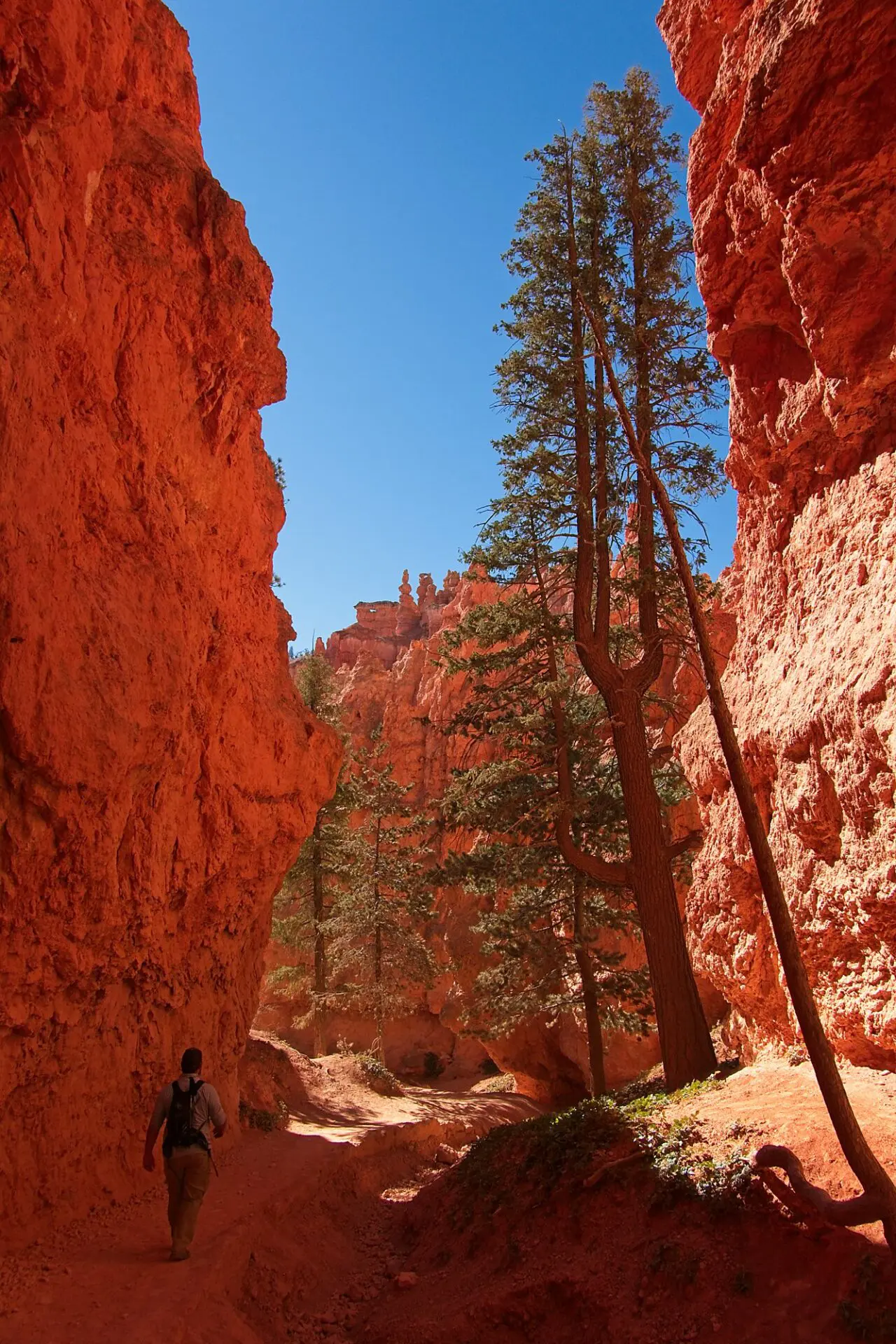
If you like slot canyons, definitely check out the Wall Street portion of the Navajo Loop. The slot canyon is short but impressive. Its walls are high, and you’ll traverse a series of sandy switchbacks. Depending on the time of day, the light coming through is incredible.
And then, on the Two Bridges portion of the loop, you’ll get amazing views of the park’s tallest hoodoo, Thor’s Hammer!
Use stop 11 on the free park shuttle for this hike.
5. Queen’s Garden Trail
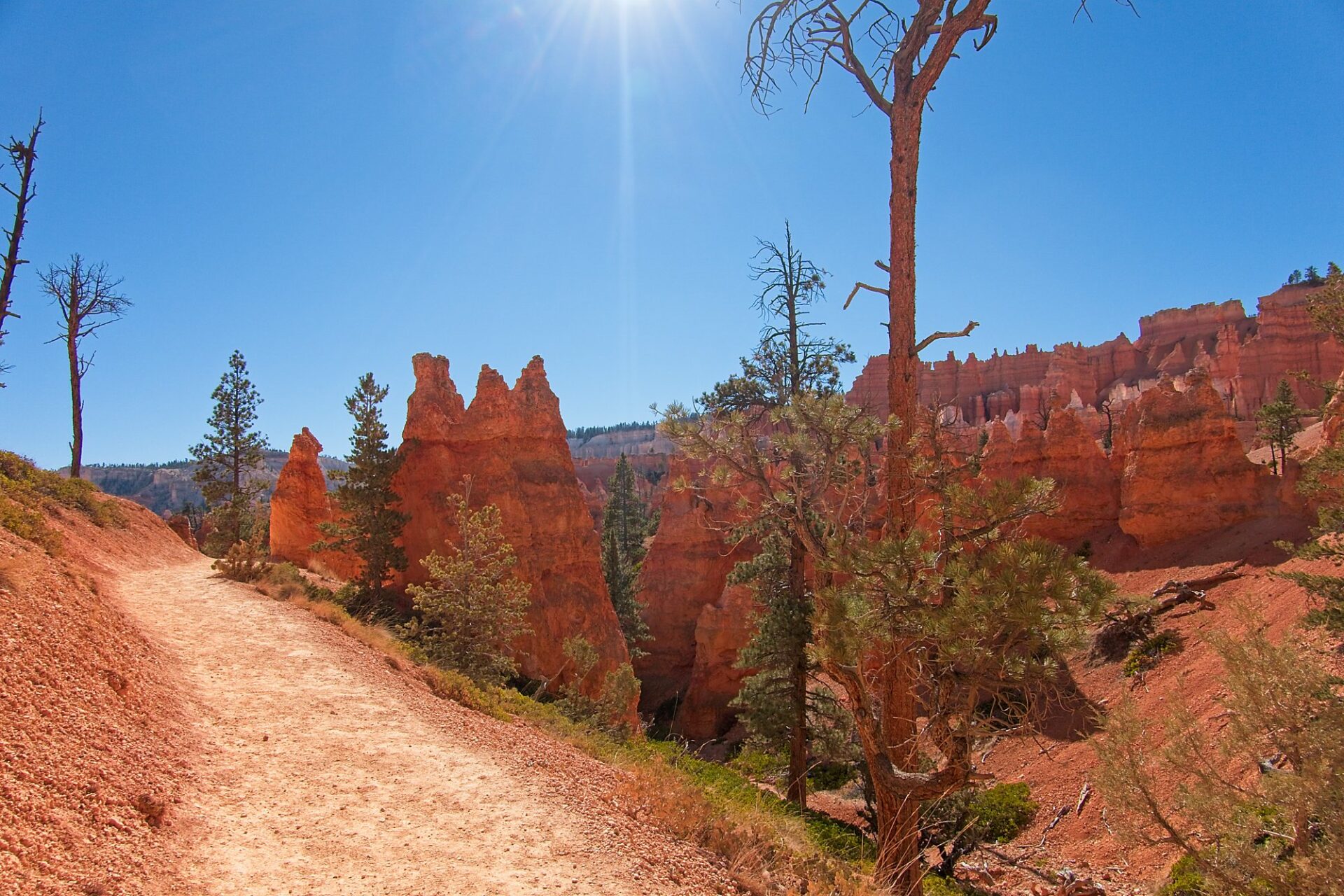
A connector trail allows you to combine the Queen’s Garden Trail with the Navajo Loop Trail for a 2.9-mile comprehensive experience (with an elevation gain of 625 feet). Taking this connector and combining these two is the best way to see most of the park’s most famous sights. (You’ll just have to decide if you want to take the Two Bridges or Wall Street side when completing this loop.)
The Queen’s Garden Trail alone is 1.8 miles long. You’ll start on the Rim Trail, which offers expansive views of the Bryce Amphitheater, and then descend to get close to the hoodoos. This is one of the less strenuous hikes that dips into the canyon. But don’t worry; this moderate trail still has 450 feet of elevation gain and steep grades, making it a challenge.
A short spur at the end of this trail descends along a ridgeline down to a unique hoodoo. This rock formation is said to resemble Queen Victoria!
Use stop 13 on the free park shuttle for this hike.
Best Hikes in Bryce Canyon National Park for Avid Hikers Up for a Challenge
These are the best trails in Bryce Canyon for hikers looking to take part in an extensive trek while visiting the park:
6. Fairyland Loop
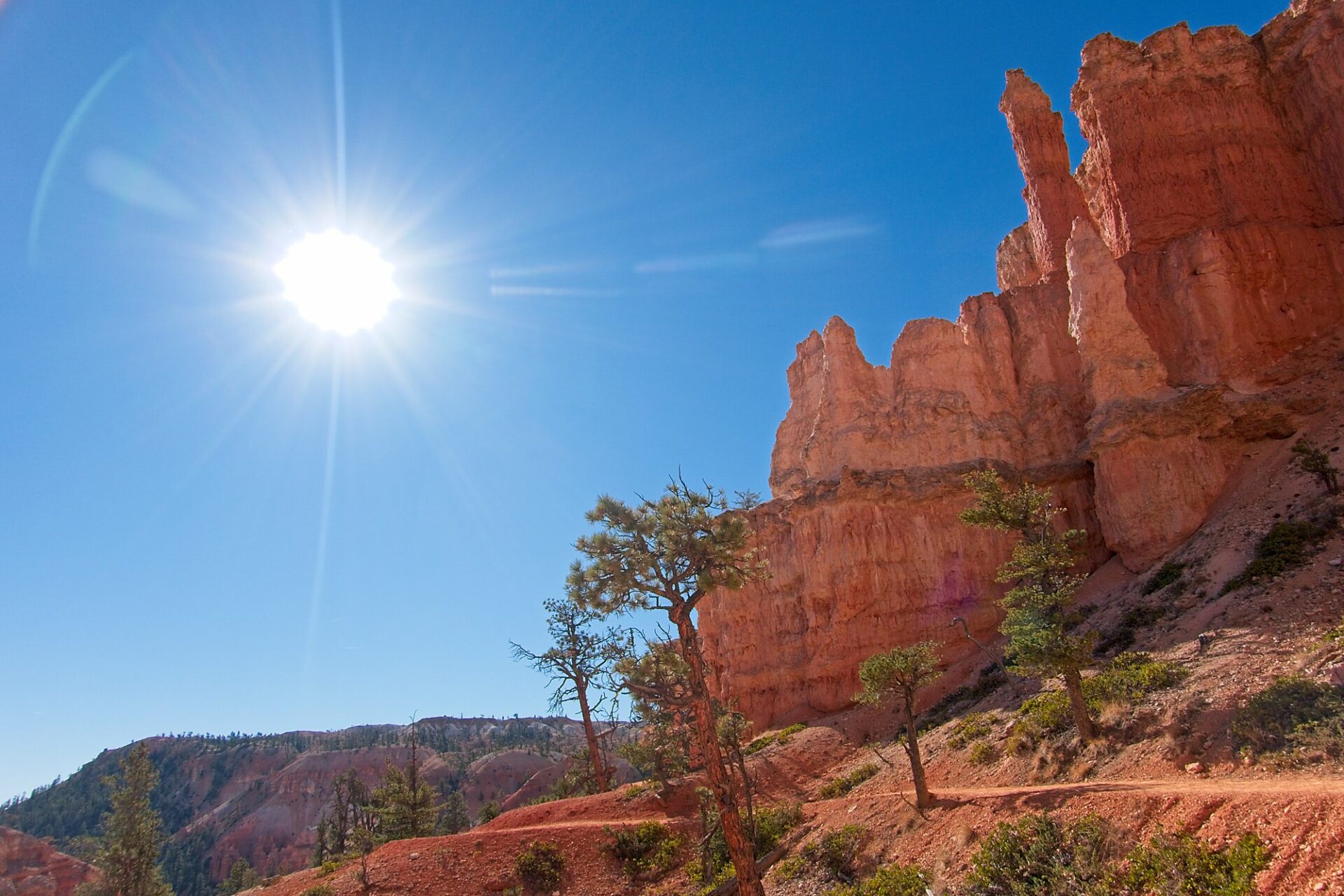
The Fairyland Loop is hands down one of the best hikes we’ve ever done! Since hiking it, it has remained on our “Top 10 in USA” list. I highly recommend this 7.8-mile hike, which takes you along a plateau rim and down into the canyon. It’s full of stunning, expansive views and unique sites to see as you hike across various landscapes and among the hoodoos, including Boat Mesa.
It’s definitely strenuous, so plan on taking 4 to 6 hours to complete the entire loop. The total elevation gain is 1900 feet, so bring plenty of water and good shoes!
There is no shuttle stop at Fairyland Point.
7. Peekaboo Loop
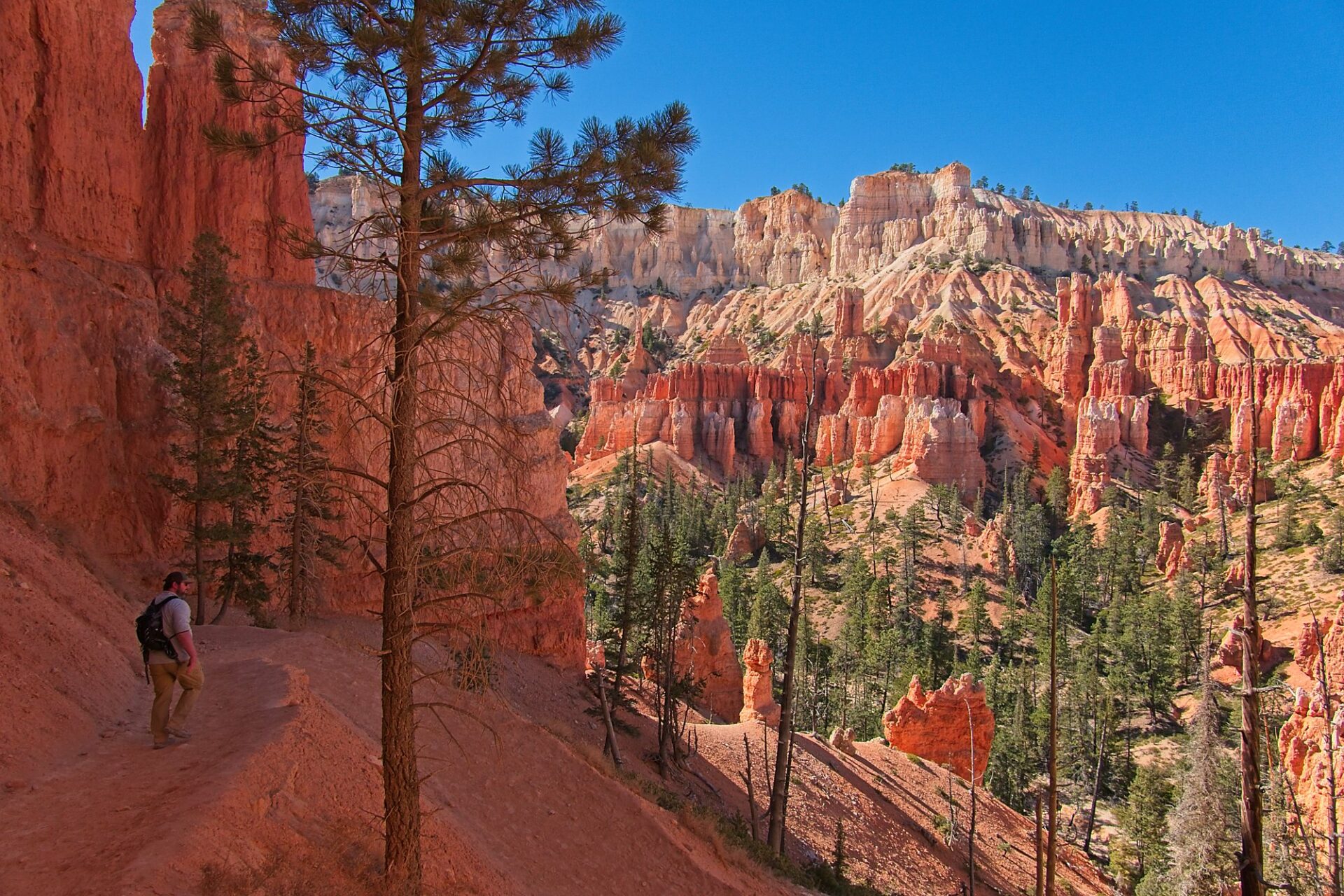
Look no further than the Peekaboo Loop for a steep adventure that takes you down to the floor of the Bryce Amphitheater.
On this 5.5-mile hike, you’ll journey through pine forests and hoodoo tunnels, see many interesting rock formations, and be rewarded with panoramic hoodoo-filled sights. A highlight is the Wall of Windows, a formation of hoodoos with window-like cut-outs in the rock.
This is considered a strenuous hike with 1560 feet in elevation gain. This trail allows horses and mules.
Use stop 8 on the free park shuttle for this hike.
8. Hat Shop Trail
If you want to get a taste of the Under-the-Rim Trail, the Hat Shop Trail takes you along the first 2 miles on this 4-mile out and back hike.
You’ll descend 1,380 feet, see a bit of the Grand Staircase in the distance, and see balanced rock hoodoos alongside the trail.
These hoodoos look like they’re wearing hats— giving the trail its fun name.
Use stop 8 on the free park shuttle for this hike.
Best Backpacking in Bryce Canyon National Park
This is the best backcountry camping option in Bryce Canyon:
9. Riggs Spring Loop
The 8.8-mile Riggs Spring Loop isn’t a hike for those who want to be amongst the hoodoos but for those who want solitude.
Beginning at Yovimpa Point, this loop passes through different types of forests and offers gorgeous views of red cliffs. Hikers have been known to spot deer, elk, and even bears along this serene path.
Unlike the popular trails within the Bryce Amphitheater area, where camping is unavailable, this trail has four campsites. So, you can hike this loop in one day or spend the night at one of the backcountry campsites.
Here is more trip planning and permit information for this trail, which gains 2,500 feet in elevation.
10. Under the Rim Trail (Shuttle Available)
Backpackers looking to spend a couple of nights backcountry camping in a hidden gem area of Bryce Canyon can hike the Under the Rim Trail. It includes some faraway views of rock spires and formations; however, most backpackers hike this path to experience a different kind of sightseeing experience than the front country provides near the Bryce Amphitheater. Here, you will encounter a variety of lovely forests, (often dry) creeks, and meadows.
This hike is 22.9 miles long one way (from Rainbow Point to Bryce Point) and gains 5,800 feet of elevation. Remember your permit!
If you don’t want to tackle the whole hike, you can use three connecting trails to cut this hike short.
You’ll finish this hike at stop 8 (Bryce Point) on the free park shuttle; however, you’ll need to find transportation to the starting point. Bryce Canyon Scenic Tours & Shuttle Service offers shuttles to the starting location.
Other Things to Do at Bryce Canyon National Park
Beyond hiking, there are plenty of other activities to experience at the park. Here are some of the fan favorites:
11. Stop By the Visitor Center
It is always recommended that you stop at the park’s visitor center. They are your home base for information about the park during your visit.
This park’s visitor center is open daily. It provides detailed information on the current condition of the roads, trails, and weather. You can also get more details on ranger programs and local amenities and watch a 24-minute film about the park.
Use stops 6 or 14 on the free park shuttle for this destination.
12. See the Views from Inspiration Point
Look no further than Inspiration Point for views of intricate hoodoos against the beautiful backdrop of Boat Mesa. This is a popular sunrise spot.
Use stop 9 on the free park shuttle for this destination.
13. See the Views from Bryce Point
This overlook is considered to give you the most incredible and comprehensive view of Bryce Canyon.
Use stop 8 on the free park shuttle for this destination.
14. Go Horseback Riding
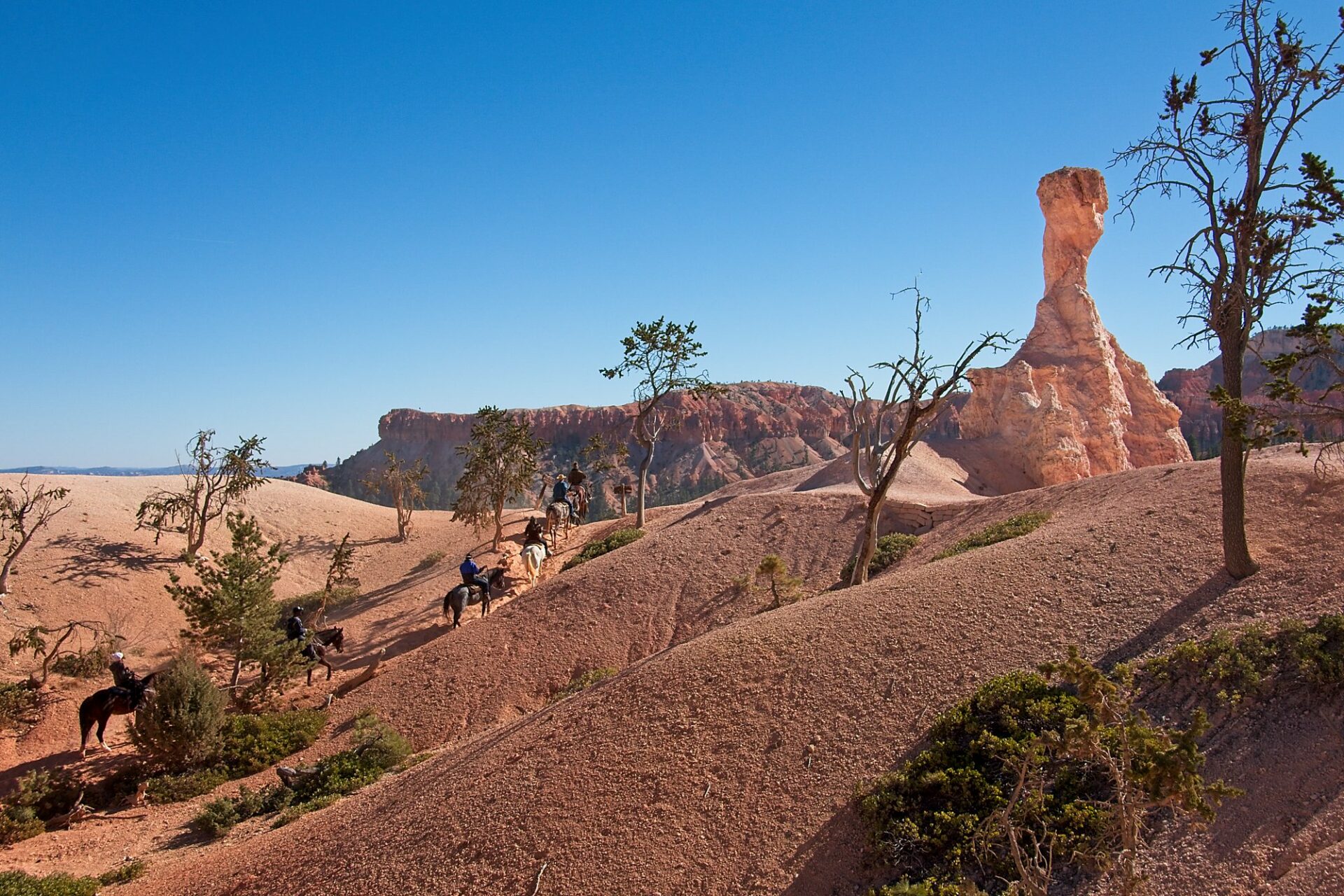
Horses have long been used to explore Bryce Canyon. Join this tradition and explore the 4.5 miles of horse trails.
Canyon Trail Rides offers two and three-hour guided horseback rides. These are super fun ways to explore the canyon.
15. Take a Car Tour: Drive the Main Road UT-63 (Bryce Canyon Scenic Drive)
Exploring Bryce Canyon via a DIY car tour and driving your vehicle into the park for at least one day is worth it. That way, you can see all the park’s incredible views that you can’t reach via the complimentary shuttle. Many gorgeous vistas are visible without ever walking too far from your car.
Pro tip: All the views are on the east side of the road. If you drive to the end of the road first, navigating all the traffic and viewpoint stops along your drive back will be easier. Also, head out early to beat the portion of the crowd that will likely be doing the same.
16. Experience the Ranger Programs
These ranger talks are perfect if you want to learn all about the history of this magical place. Make sure to check the calendar to see which are offered while you’re at the park.
Hoodoo Geology Talk
This year-round talk about the geologic and anthropological history of Bryce Canyon is hosted at 11:00 a.m. at Sunset Point.
Rim Walk
During the summer, at Sunset Point at 2:00 p.m., a ranger will walk and talk with a group about the hoodoos and cultural history of the area.
Night Sky Telescope Program
Bryce Canyon National Park is an International Dark Sky Park!
On the weekends in the summer, you can take advantage of the dark skies via the night sky telescope program! Rangers will teach you all about the night sky and let you look at features in the sky through the National Park’s telescopes.
Advanced reservations are required.
Full Moon Hike
For a super cool and unique experience, look no further than a full moon hike.
Offered one to two nights each month (weather permitting), the hoodoos look otherworldly in the waxy light of the full moon. It’s a fun and unique way to explore Bryce Canyon.
Advanced reservations are required.
Snowshoe Hike
Guided snowshoe hikes are perfect for beginners after significant snowfalls. See the ponderosa pines with a dreamy coat of snow and the hoodoos in the middle of winter!
Snowshoes and poles are available at no cost.
Bryce Canyon National Park Hiking Map
Here is a link to a map of all the hiking paths within the park.
Popular Tours Near Bryce Canyon National Park
Where to Stay in Bryce Canyon National Park
These are your accommodation options within the park:
Lodge Option in Bryce Canyon National Park
If you’re not interested in tent camping but want to spend the night in the park, the lodge is the place to go.
The Lodge at Bryce Canyon
An iconic structure in the park, the lodge (and surrounding motel) is super close to the Bryce Amphitheater.
Camping in Bryce Canyon National Park
There are two campgrounds in the park— North and Sunset.
Both are close to the Visitor Center and Amphitheater. Still, you’ll want to check the season and make a reservation during the busy months.
It’s $30 for RV camping and $20 for tent camping a night.
North Campground
Open year-round.
Sunset Campground
Open April to October. Closed for winter.
Where to Stay Near Bryce Canyon National Park
These are your accommodation options near the park:
RV Park & Campground Option Near Bryce Canyon National Park
For RVers and campers:
Ruby’s Inn RV Park & Campground
A destination in itself, Ruby’s Inn has hotel accommodations, an RV Park, and a campground.
It’s in Bryce Canyon City, so it’s super close to the National Park. It also offers Horseback Riding, Mountain Biking, and other fun Western experiences.
Hotels Near Bryce Canyon National Park
These are the closest hotels to Bryce Canyon National Park. The main perk of staying at any of these hotels is that the free shuttle stops at them all (as well as Ruby’s Inn). So, on a day you want to see the main sights, you can take the shuttle and not have to deal with parking within the park.
Bryce View Lodge (Part of Ruby’s Inn)
Best Western Plus Bryce Canyon Grand Hotel
Best Western Plus Ruby’s Inn
VRBO’s Near Bryce Canyon National Park
Where to Eat Near Bryce Canyon National Park
Inside the park, the lodge has a seasonal dining room and a general store selling snacks. There is also a pizzeria within the park. Outside of the park, there are a handful of options as well.
My personal favorite is…
Bryce Canyon Pines
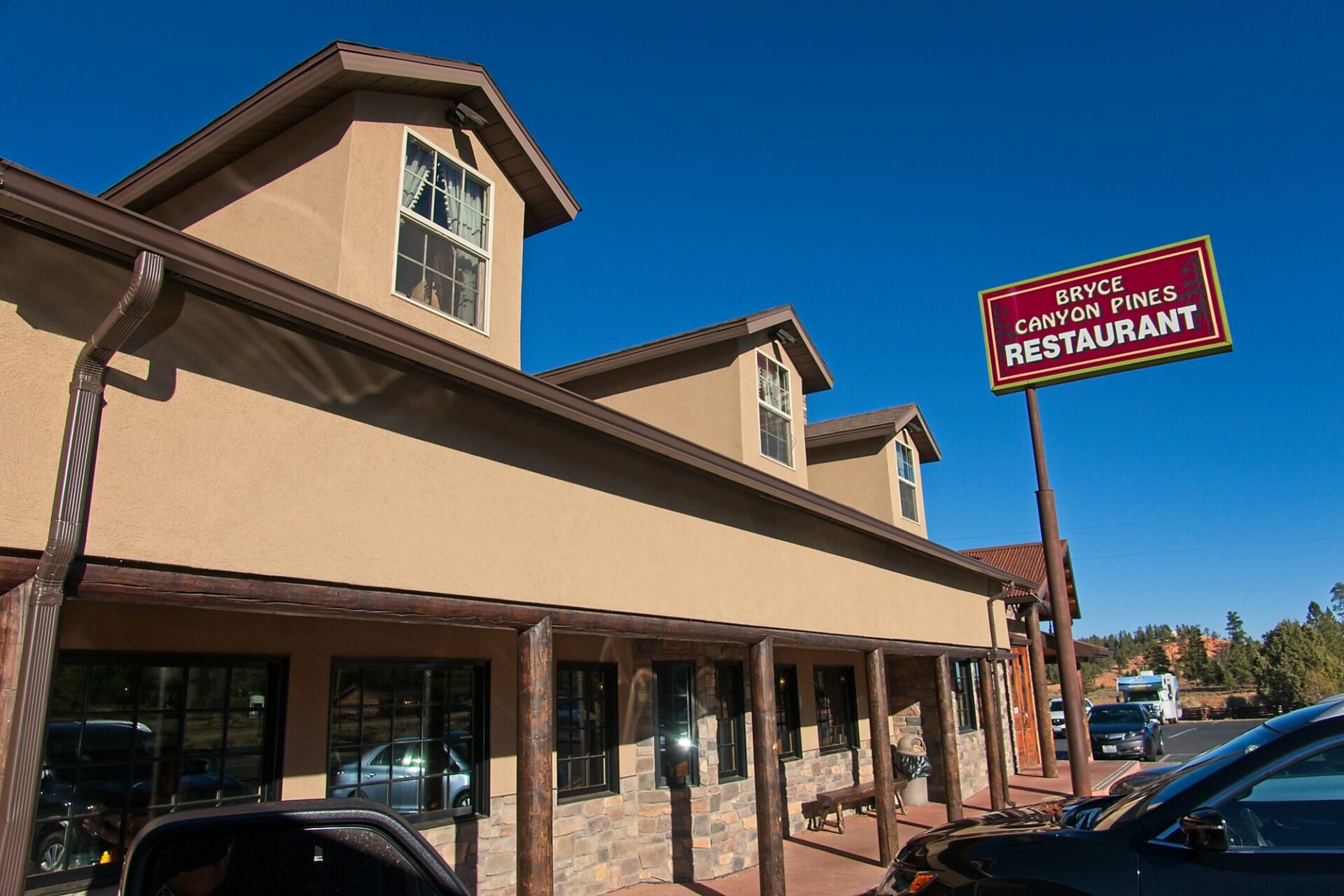
If there is one place I recommend you go to fill your tummy after a full day of exploration, it’s Bryce Canyon Pines! Here, hearty, home-cooked meals are the order of business. They also have one of the largest selections of pies you’ve ever seen.
The Banana Blueberry Cream Pie, featuring Ethel’s top-secret cream topping, is to die for! In my opinion, it rivals Magnolia Bakery’s famous banana pudding.
Tips for Your Bryce Canyon National Park Visit
These are my top tips to help you prepare for a Bryce Canyon National Park trip.
Weather Tips
The high-elevation climate of Bryce Canyon means the weather there can really vary. It’s always good to prepare for precipitation or snow (depending on the time of the year).
Summer often brings heavy rain and severe lightning. If it’s lightning, get indoors and be aware of flash flooding possibilities if it has been raining.
Winter temperatures can get significantly low. Make sure you have adequate layers to wear during this season.
Hiking Etiquette
Know your right of way— check and abide by any posted signs for the trails. Typically, hikers coming uphill have the right of way.
Also, always follow the seven Leave No Trace principles. Stay on the trail and carry everything you brought back out again.
FAQs:
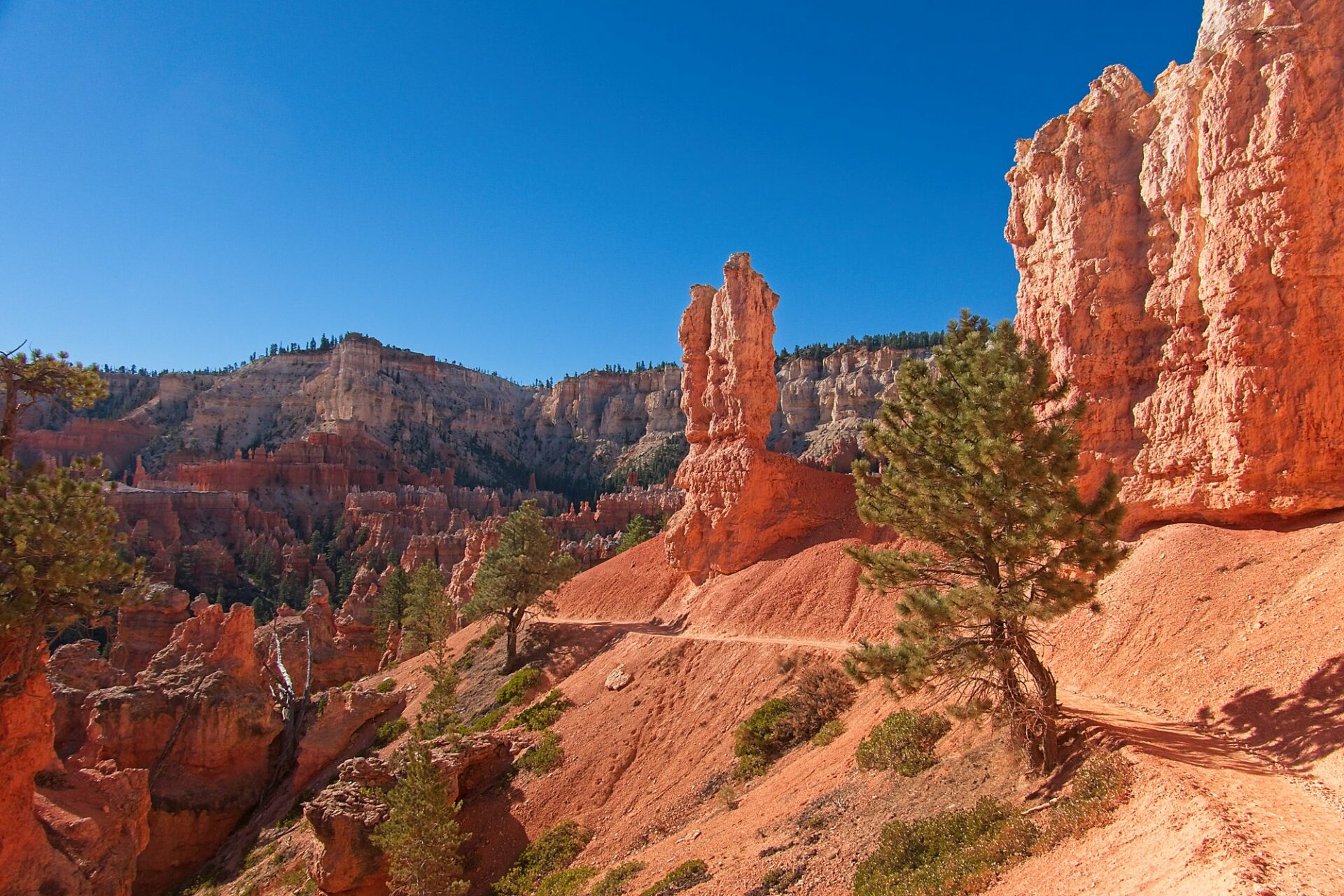
These are answers to the questions I most commonly get asked about Bryce Canyon:
What Should I Pack for a Bryce Canyon National Park Day Hike?
For many of the hikes in Bryce Canyon, you’ll ascend or descend with very little shade on rough terrain. Stock up on sunscreen, wear a hat, moisture-wicking layers, and hiking boots, and bring plenty of water and food on hikes.
💧 A Full Water Bottle or Hydration Bladder.
- An all-new comfortable handle allows for true one-handed filling. This easier-to-fill design is also easier to carry and pour.
☀️ Sunscreen.
- Sun Bum Original Moisturizing Sunscreen Spray SPF 30 | Vegan and Reef Friendly | Octinoxate & Oxybenzone Free | Broad Spectrum UVA/UVB Sunscreen
🧢 Sun Hat.
- High Ponytail Design: Sun hats for women features a unique high ponytail opening, allowing you to wear your hair up comfortably while keeping cool in the sun
⛑️ First Aid Kit.
- Expedition-Grade Kit: Designed to support up to 2 adventurers for up to 2 days, this mountaineer first aid kit is a must-have for extended outdoor excursions and remote expeditions
🗡️ Multitool.
- A CUT ABOVE THE REST: Compact, agile and ready to face any adventure head-on. Our range of Swiss Army Knives have been established since 1897 and continue to be an icon of utility and smart design.
🌶️ Pepper Spray.
- TRUST THE PROFESSIONALS: SABRE is the #1 Pepper Spray brand trusted by police and consumers worldwide, including New York PD, Chicago PD, and U.S. Marshals; Made in the USA
🎒 Daypack.
🌯 Hiking Fuel. Read more about healthy food options for hiking that will boost your energy while on the trail here.
👚 Clothing Layers. Learn more about hiking clothing here.
🗺️ Map. The National Park should give you one when you enter. Be sure to throw it in your pack. Also, download your offline map to your phone before arriving at the park.
Where are Dogs Permitted?
While the US National Parks technically welcome pets, the honest truth is that some parks are more accommodating than others. I would put Bryce Canyon on the less accommodating side of the spectrum purely because it’s Utah’s smallest National Park and, therefore, has minimal places for them to go.
So, Bryce Canyon National Park is not the best place for dogs.
However, if you do decide to bring your dog, pets are only permitted on paved surfaces in the park—the campgrounds, paved roads, and paved viewpoint areas—but not on hikes, except for the section of Rim Trail that is paved between Sunrise and Sunset Point and the paved path between Bryce Canyon’s entrance and Inspiration Point.
The park recommends dog owners looking for comparable scenery take their furry friends to the nearby US Forest Service-managed Red Canyon area instead.
Where are the Best Picture Spots at Bryce Canyon National Park?
There are so many unique photo spots in Bryce Canyon. The whole park is photogenic, so you’ll find plenty to take pictures of. For midday photographs, check out the Navajo Loop Trail.
All of the scenic viewpoints are unique picture spots, though! Each one offers something special and different, so honestly, no matter where you go, you’ll be sure to leave the park with your phone’s memory packed full!
Where are the Sunrise and Sunset Spots at Bryce Canyon National Park?
I’ll start by saying that due to the layout of Bryce Canyon itself and the park’s road and viewpoints, this is more of a sunrise destination than a sunset spot.
Seeing the sunrise from the canyon rim is an absolute must-do while in the park! (As for the sunset, I could go either way.)
For a Sunrise Photo:
Since many of the viewpoints in the park look east into the Amphitheater, it’s hard to go wrong in picking a viewpoint for sunrise viewing.
Sunrise Point, Sunset Point, Fairyland Point, and Inspiration Point will all give you a picture of the sunrise that includes the sun in the picture, like the one below (that picture is from Fairyland Point).
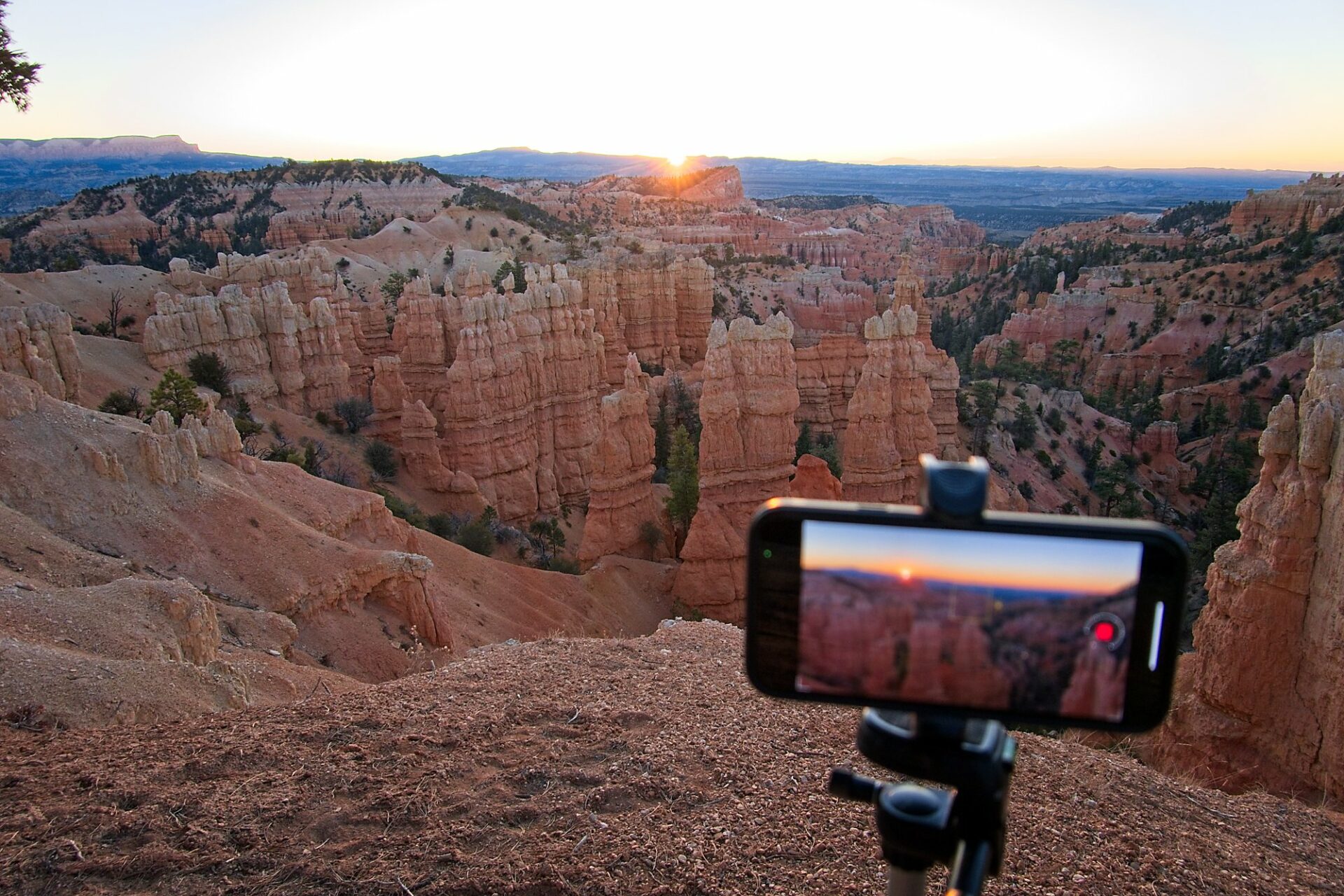
These are the main differences between the three:
Sunset Point is the most accessible and closest to Sunset Campground. Since it is easy to get to, it will be busy. You’ll see a lot of color here and some of the most well-known hoodoos, including Thor’s Hammer.
Sunrise Point involves a small walk down the Rim Trail but is still reasonably easy to get to. It’s a trendy choice due to its name and proximity to the Sunset Campground. It will also be busy.
Fairyland Point is my personal favorite. You must drive to this outlook, but it’s worth the drive because of the great contrast of greenery against the rocky hoodoos.
Lastly, Inspiration Point and Bryce Point offer comparable, less crowded options. Both viewpoints still offer comprehensive views of the park’s main part, Bryce Amphitheater.
For a Sunset Photo:
As you would imagine, since so many spots are fantastic for sunrise photos, the park is a bit more complicated to photograph at sunset. You’ll be dealing with shadows from the mountains at most of the viewpoints.
This might not be a popular opinion, but my number one choice for sunset would be to go to dinner. 😂 A lot of the crowd will be posted up for sunset. This means the dinner options around town will have fewer people.
That said, if you’re motivated to see a sunset, consider the park’s highest point, Yovimpa Point. Much of the crowd won’t drive to this end of the park, and this viewpoint provides sweeping views of red rocks and pine all the way to the Grand Staircase.
What is the Best Hike at Bryce Canyon?
While each hike at Bryce Canyon offers something different, the Navajo Loop, Queen’s Garden Trail, and Fairyland Loop are all crowd favorites. All three have amazing views, lots of hoodoos, and gorgeous greenery!
How Many Days is Enough in Bryce Canyon National Park?
You can see a lot of Bryce Canyon in a day, but I recommend spending at least two to three full days at the park. That way, you can stop at all the viewpoints, catch at least one sunset and sunrise, attend a ranger program, and hike several trails.
This is the itinerary I recommend for hikers hoping to cover the park in a three-day visit:
Day 1
Do the DIY Car Tour on your first day to get the lay of the land. During your tour, stop at as many viewpoints along the way as you desire. Consider hiking the Mossy Cave Trail and/or the Bristlecone Loop.
Attend the ranger-led Night Sky Telescope Program this evening.
Day 2
Embrace the shuttle on this day. It can take you to the trailheads for the Rim Trail, Navajo Loop Trail, Queen’s Garden Trail, Peekaboo Loop, and Hat Shop Trail.
Look at the mileage for each of those and decide which hikes through the Amphitheater you’d most like to do.
Day 3
Drive into the park, watch the sunrise at the Fairyland trailhead, and then hike the Fairyland Trail.
Is Bryce Canyon Worth Visiting?
Bryce Canyon truly has some fascinating landscapes you won’t see anywhere else! The pink and orange rock formations are stunning and unique. You may just find yourself returning again and again.
Wrap-Up: The Best Hikes and Experiences at Bryce Canyon National Park
There are so many amazing adventures to discover at Bryce Canyon National Park! I dare say it was my favorite park in Utah’s Mighty Five! I hope you have a fantastic time on your visit!
Did you think of something I didn’t include? Email me and let me know! I’ll be sure to get the information here!
Did you use this guide? Please also email me! I’d love to hear how your trip went!
You May Also Enjoy:
⭐️ A Local’s Guide to the Best Mount Rainier Hikes
⭐️ The Ultimate One Day Badlands National Park Road Trip Itinerary
⭐️ A Smoky Mountains Itinerary for Every Type of Traveler & Everything Else You Need to Know!
- Hiking the Appalachian Trail: Week 3 Thru-Hike Journal - March 27, 2025
- Best Appalachian Trail Shoes for Long-Distance Hiking - March 4, 2025
- Backpacking Clothes for an Appalachian Trail Thru-Hike - March 4, 2025

